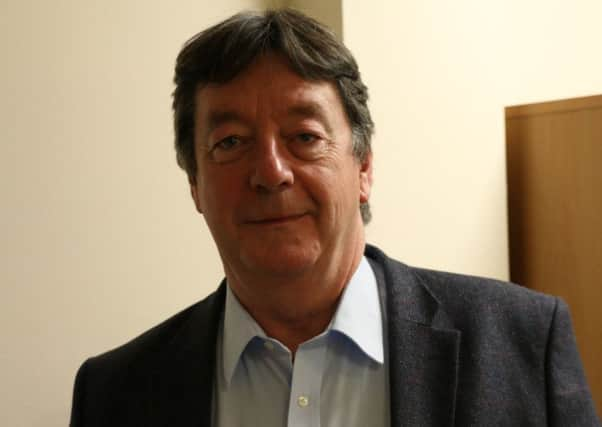Monday interview: Technology entrepreneur Peter O'Hara
This article contains affiliate links. We may earn a small commission on items purchased through this article, but that does not affect our editorial judgement.


In a world that is “drowning in data”, extracting information from a sprawling variety of repositories ranging from e-mails and file hosting to servers and cloud storage is an increasingly time-consuming business.
The inability to effectively search through this mass of material costs millions of working hours every day, according to technology entrepreneur Peter O’Hara, but he says his newest venture has developed a lifeline to survive this storm of facts and figures.
Advertisement
Hide AdAdvertisement
Hide AdFollowing a year of testing by a dozen organisations from sectors imbued in large volumes of data, Nalytics is set for a general market launch early in the New Year. Developed by Glasgow-based Nalanda – part of O’Hara’s OLM Group of companies – the technology “picks up where Google finishes”.
“Most people are familiar with the Google search engine but its search capabilities are really quite basic and typically present too many results for users to be able to decipher,” says O’Hara. “Our platform covers the whole of your information store from e-mails and attachments to Dropbox data, and the application does not have to be launched to view and review the data. There is no such thing as unstructured data – all data has an inherent structure.”
Nalytics works by creating “threads” connecting disparate sources of information based on a search term chosen by the user. For example, a review of Hansard – the official record of House of Commons proceedings – could produce an analysis of a single politician’s views on topics such as Brexit or the Iraq War.
Nalytics searches up to millions of pieces of data in minutes, and then organises findings in such a way that users can “zoom in” on any particular bit of information. In this way, the answers can be sifted from a complex mass.
It’s an idea that O’Hara and Nalanda co-founder David Rivett, the company’s chief operating officer, starting kicking around several years ago when O’Hara was thinking about ways to improve operations in some of his businesses.
Born near Greenock, O’Hara and his four siblings were raised on Scotland’s west coast where their father James worked as a psychiatric nurse. The elder O’Hara moved into nursing in his early 30s after re-training from his previous career in engineering – a diverse career path that his son emulated. “I’ve probably got this eclectic gene in me, same as my dad – you want to do one thing but then wind up doing something else,” O’Hara says.
Not one for the “practicalities” of the prevalent 1980s Glasgow employment option of the shipyards, O’Hara grew up with a nursing career in mind. His intention was to follow that path upon leaving school, but at 17 was a year shy of qualifying to sign up.
To cover the gap, he spent two years at Glasgow College of Technology, where he pursued business studies. He then had a spell working for the Greater Glasgow Health Board before deciding to continue his education at Queen Mary’s College London, which would prove the “turning point” in his career path.
Advertisement
Hide AdAdvertisement
Hide Ad“I arrived with enough money in my pocket to last ten weeks, so had to work my way through college,” O’Hara says. “It was a good maturing exercise as much as anything else. It changed me quite profoundly – my interests changed, and what I wanted to do with my life changed.”
To support his studies in economics and politics at Queen Mary’s, O’Hara took a full-time position as the overnight emergency duty officer at Hammersmith Hospital in the west of London. By this time he had determined that nursing was not his calling. At the same time, his studies had opened a world where he could pursue bigger ideas.
Upon graduation, he joined the local council in Camden where he worked for 11 years in health management. He set up OLM in 1991 with “£1,000 in my pocket” and the aim of using IT to improve the system for both providers and those receiving care. After some ten acquisitions and a few in-house start-ups, OLM Group has annual sales of £14.8 million. Nalanda, which grew out of O’Hara’s ambition to advance the use of IT in OLM’s healthcare operations, will initially target sales of Nalytics into that market along with other data-intensive sectors such as pharmaceutical research, investigative journalism, risk management and legal research.
“Twenty-five years on, I am still driven by the same underlying idea of how to make a difference, and how to move things on,” he says.
30-SECOND CV
Born: 1956, Greenock
Education: St Columba’s School; Glasgow College of Technology; Queen Mary’s College London
First job: Auxiliary nurse.
Ambition at school: All of my early years I thought I would be a nurse. It is what my father did.
Can’t live without: Ideas
Kindle or book? I still prefer a book, although I also use a Kindle now.
Favourite city: For the skyline, probably Hong Kong, but for fun and atmosphere, it is New York.
Preferred mode of transport: Car
What car do you drive? Jaguar
What makes you angry? Extreme inhumanity
Advertisement
Hide AdAdvertisement
Hide AdWhat inspires you? Anybody who is trying to change the world and make things better.
Best thing about your job: Being an owner-manager is the freedom to pursue ideas.